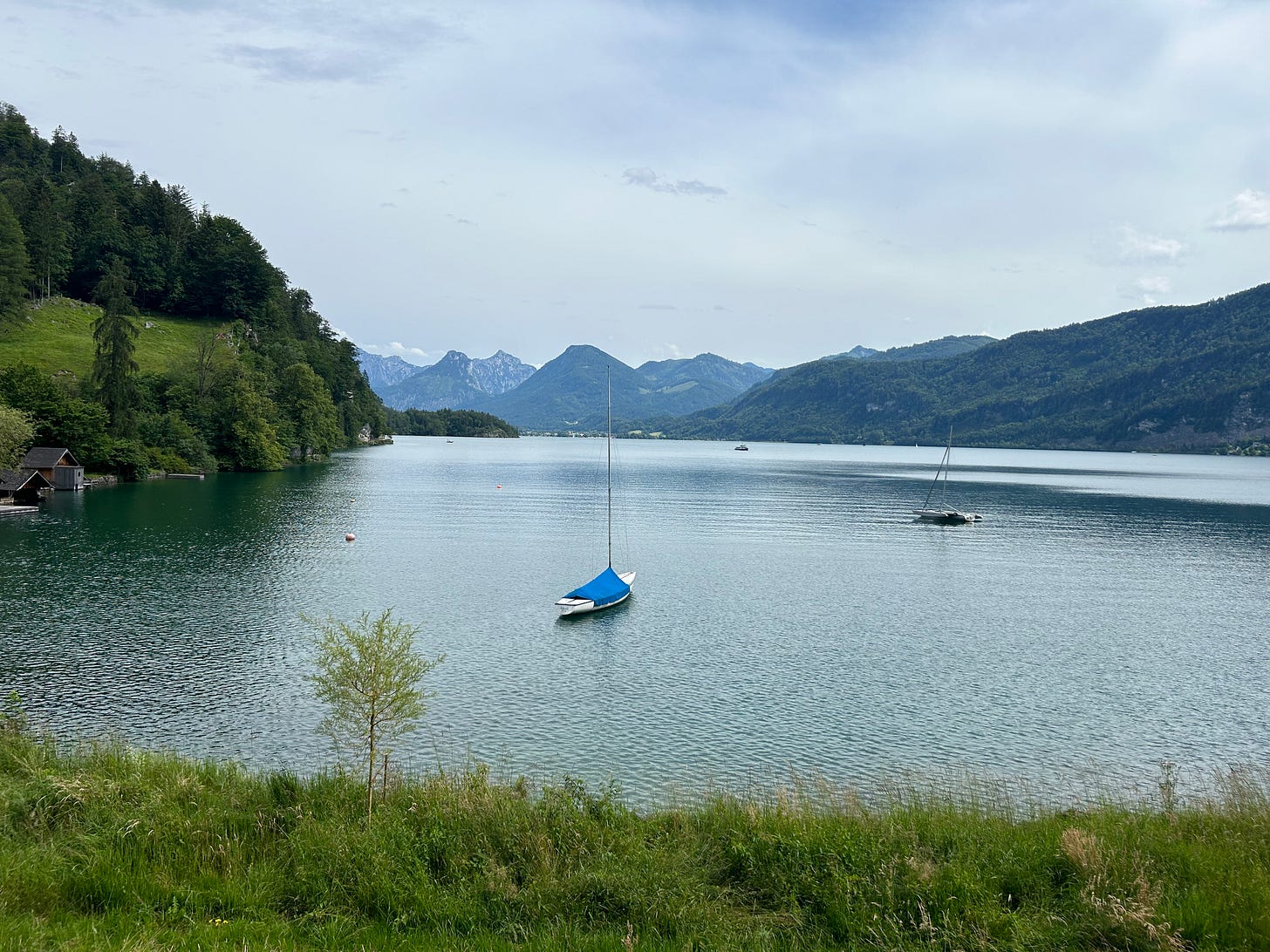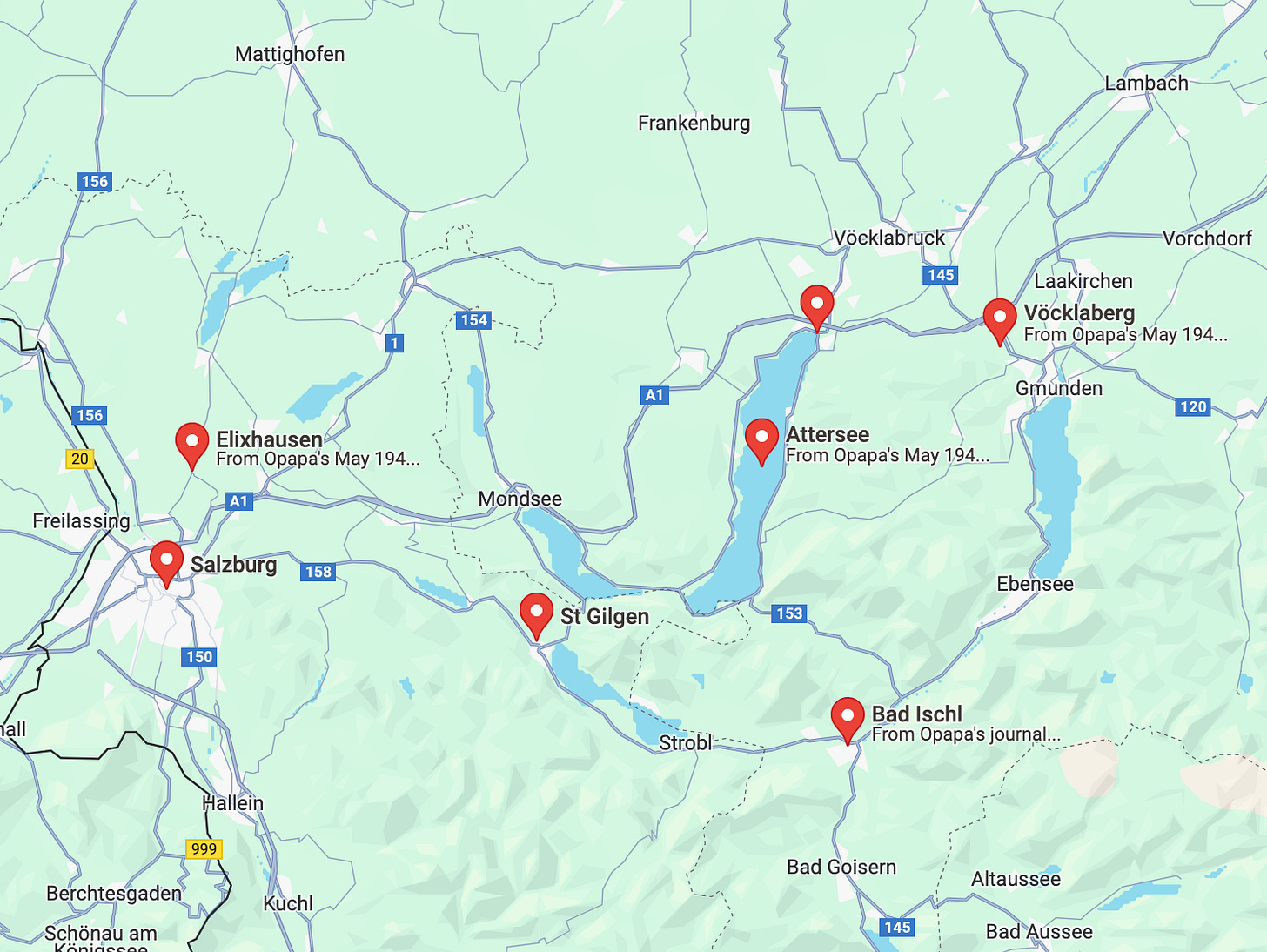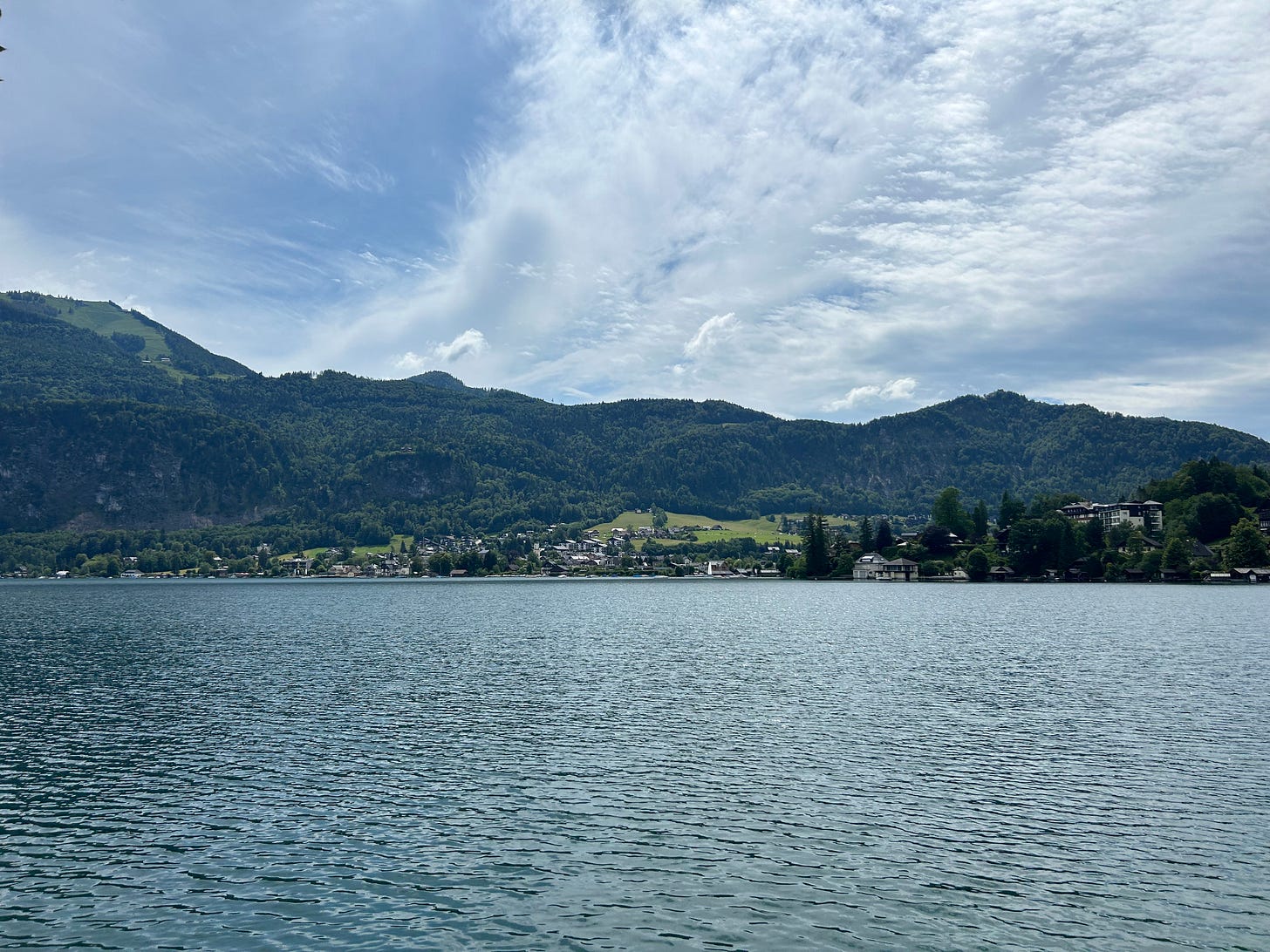I am sitting in the St. Gilgen boat club, overlooking the stunning Wolfgangsee in Austria. I have accompanied my friend Lizzie to the lake — she lives in Salzburg, and is taking rowing lessons here. I can see why: the peaks rise from the placid water, and the lush greenery of the sharply rolling hills offer a sense of serenity and peace. As we drove here, Lizzie and I talked about how these lakes were made by glaciers; how the awareness of this deep time puts our own problems in perspective.
This feeling — this sense of calm — is in sharp tension with my research: I wanted to come here, in part, because St. Gilgen is where my grandfather came to hunt Nazis in May of 1945, just after the end of the war. As I sit here, glancing occasionally at Wolgangsee, I read through his typed diary:
“May 15: The first afternoon went out to Bad Ischl to see Olszi Imre (or Sandor). Found him in CIC custody.” He had been picked up “from the courtyard of a hotel, where he was staying with his horses and wagon, wife and daughter.”
Bad Ischl is about 14 miles east from where I am sitting. Closer still is Attersee, where Opapa found “a Hungarian Red Cross Camp, and the former Vienne consulate with a lot of shady characters running around” in late May 1945.
Other Hungarian fascists were farther to the west — Opapa found former Hungarian Prime Minister Béla Imredy near the alpine town of Kitzbühel, living on a farm “some 8 km off the main road,” along with Mihaly Kolozsvary-Borcsa, the Chief of the Press Chamber.
The most bizarre — or perhaps “typical” — Nazi-hunting story happened right here where I am sitting, in St. Gilgen, a picturesque town on Wolfgangsee.
On May 29, 1945, Opapa described how “one of [the OSS] informers is a Hungarian Jew living in St. Gilgen.” Before liberation, he was “denounced to the Gestapo by a Baroness Alicia Steigen living [in the] next house to her.” Why? Well, “Steigen was a girlfriend of the local Gestapo chief Moller,” explained Opapa. Steigen was also “a white Russian, German citizen,” and had reportedly done “special jobs” for the “Wehrmacht in Russia.”
The subsequent events are as bizarre as they are banal. As the Russian army approached, Moller, the Gestapo chief, gave Steigen a letter naming the Hungarian Jew as a person she could go to for help if the Russians arrived. But instead of taking his advice, Steigen replied by denouncing the Hungarian Jew — who was also her neighbor — to the local police “on the charge of pro-Russian sympathies.” The police called the Salzburg Gestapo, and the Hungarian Jew was arrested.
The next day, the Americans arrived and released the Hungarian Jew from prison. Once the Americans occupied Salzburg, Steigen quickly switched sides and “became a great friend of the allies.” Apparently, she had especially “close relations with some local U.S. officers and GI’s.”
Over the next weeks, the American GIs had such loud parties at her house that “the neighbors complained.” According to Opapa, “the whole neighborhood was terrorized by the [US] soldiers, and scandalized by the influence this Steigen woman exerted on the local Americans.”
Soon thereafter, the Hungarian Jewish informer visited Steigen’s house to “inquire about the name of the American officer who had been [a] frequent visitor.” The story then took another bizarre twist, when the American officer had the Hungarian Jew arrested, “brought him by force to interrogation, and shouted at him for some two hours.”
It was at this point that Opapa was sent to St. Gilgen to arrest Steigen and — presumably — alert the American officer to her past. He found Steigen “at the American captain’s.” The captain was “quite humble,” and they took Steigen away “after letting her say goodby to her 80-year old mother.” He “took her into Salzbug” and “put her in jail.” “Now it’s up to CIC,” Opapa concluded.
This story is perplexing. I remember reading it months ago, and was unsure what to make of it. It didn’t fit into a neat outline of Nazi hunting. Alicia Steigen’s brazen side-switching upon the arrival of the Americans, and the fact that the Hungarian-Jewish informer — who was her neighbor — was also complaining about the noise level of the American GI parties at her house, scrambles my sense of clean historical narratives.
Also, it doesn’t totally make sense: why would Steigen denounce the Hungarian Jew just as the Americans were arriving, but not before? Why did the Gestapo chief think that the Hungarian Jew was a safe person for Steigen to approach? Also, how did the Hungarian Jew manage to survive the war living next door to Steigen and her Gestapo chief boyfriend?!
The more I thought about the situation, the more I became convinced that there was a lot more to the story. Perhaps there are other notes that Opapa took about the case that I no longer have; or perhaps there are records in the CIC archives offering some insight.
For now, however, I have to accept that this bizarre case of Nazi hunting in St. Gilgen will remain a mystery. So I look up from my computer, and gaze again at Wolfgangsee, feeling a sense of gratitude that I am here in the year 2024, and not in the 1940s. I think about the layered history of this place — how many generations of people have lived here, what types of petty squabbles they may have had, and thought about how little fights and pettiness could have horrific consequences during times of political extremism and war. It was so easy to denounce a neighbor to the Gestapo for banal reasons, and the consequences were often fatal.
I decide it’s time for a break. I leave Nazi hunting in the past, and go to meet my friend Lizzie for a boat ride on this gorgeous lake on a perfect day in Austria.
Tomorrow, the research will continue — in Vienna.
***
Nuts to crack:
Where was the CIC jail in Salzburg?
Who were Baronness Alicia Steigen and Gestapo chief Moller? I tried to look up Steigen but couldn’t find any records.







“Scrambles my sense of historical narratives” - what a beautiful line. And so true about so much of your exploration and research! Just makes you realize how much deeper and more complex all history really is. Never as cut or clean as it may seem. Trust nothing, question everything :)
It was a pleasure hunting nazi hunters with you 💗